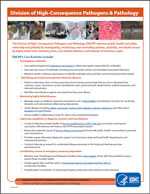Division of High-Consequence Pathogens and Pathology (DHCPP)
About DHCPP
What do scientists at DHCPP do to improve public health and safety?
- Investigate outbreaks
- Use epidemiological and laboratory techniques to determine agents responsible for outbreaks.
- Discover the source of outbreaks including environmental, animal, and transplant-associated infections.
- Monitor trends in disease transmission to identify outbreaks early and help control and prevent their spread.
- Identify previously unrecognized infectious diseases.
- Perform laboratory tests on tissue specimens from humans and animals that are sick or deceased from unknown causes. Specimens can be submitted by state and local health departments, medical examiners, and international partners.
- Identify new infectious agents and study how they cause illness.
- Monitor highly lethal diseases.
- Manage major surveillance networks and systems such as MicrobeNet and develop new tests for use by key domestic and international collaborating laboratories.
- Track diseases including rabies, poxviruses, human prion diseases, anthrax, hantavirus, and other select bacterial and viral diseases.
- Serve as WHO Collaborating Center for select viral and bacterial diseases.
- Improve capabilities to diagnose, prevent, and treat diseases.
- Conduct laboratory-based studies of human papilloma virus (HPV) infection to improve vaccination effectiveness and reduce risk of HPV-associated cancers
- Research potential causes of chronic fatigue syndrome and work with public health communities to promote new interventions.
- Provide regular laboratory diagnostic support and training to state and local health departments and international partners.
- Conduct laboratory research to understand disease processes in the body and develop vaccines and treatments.
- Contribute science to emergency response preparation.
- Monitor over 70 pathogens and diseases including many select agents.
- Study agents that could be used in a bioterrorist attack in biosafety level four (BSL-4) containment facilities.
- Provide expert consultation on planning emergency responses and medical countermeasures.
Scope of Work Chart
View a breakdown of the agents and issues the division works with, divided out by branch and office.
Contact Us:
- Centers for Disease Control and Prevention
1600 Clifton Rd
Atlanta, GA 30333 - 800-CDC-INFO
(800-232-4636)
TTY: (888) 232-6348 - Contact CDC–INFO
 ShareCompartir
ShareCompartir






